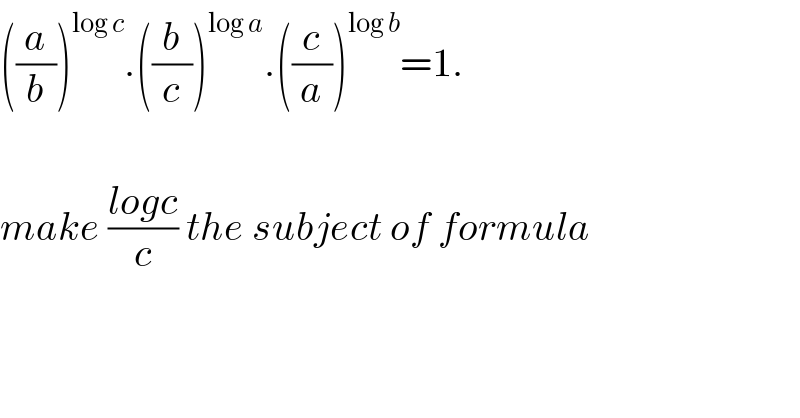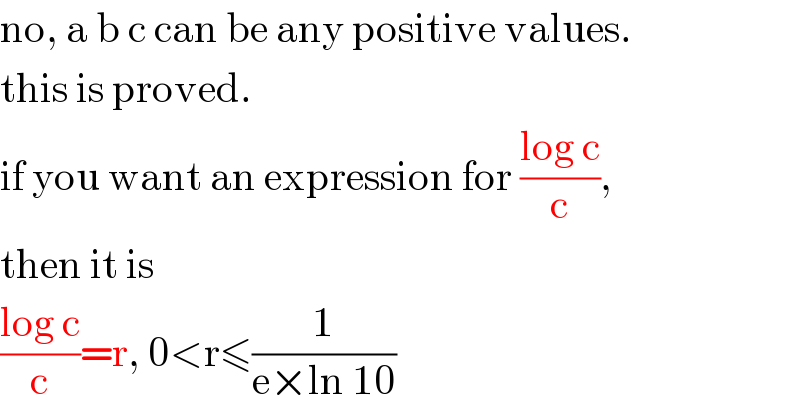
Question Number 23566 by NECx last updated on 01/Nov/17

$$\left(\frac{{a}}{{b}}\right)^{\mathrm{log}\:{c}} .\left(\frac{{b}}{{c}}\right)^{\mathrm{log}\:{a}} .\left(\frac{{c}}{{a}}\right)^{\mathrm{log}\:{b}} =\mathrm{1}. \\ $$$$ \\ $$$${make}\:\frac{{logc}}{{c}}\:{the}\:{subject}\:{of}\:{formula} \\ $$
Commented by NECx last updated on 01/Nov/17

$${please}\:{help}\:{with}\:{workings}. \\ $$$$ \\ $$$$ \\ $$
Commented by mrW1 last updated on 02/Nov/17
![for any a, b, c > 0 we have log a × log b − log a × log c + log b × log c − log b × log a + log c × log a − log c × log b = 0 log a × (log b − log c) + log b × (log c − log a) + log c × (log a − log b) = 0 log ((b/c))^(log a) +log ((c/a))^(log b) +log ((a/b))^(log c) =0 log[ ((b/c))^(log a) ×((c/a))^(log b) × ((a/b))^(log c) ]=0 ((b/c))^(log a) ×((c/a))^(log b) × ((a/b))^(log c) =1](Q23615.png)
$$\mathrm{for}\:\mathrm{any}\:\mathrm{a},\:\mathrm{b},\:\mathrm{c}\:>\:\mathrm{0}\:\mathrm{we}\:\mathrm{have} \\ $$$$\mathrm{log}\:\mathrm{a}\:×\:\mathrm{log}\:\mathrm{b}\:−\:\mathrm{log}\:\mathrm{a}\:×\:\mathrm{log}\:\mathrm{c}\:+\:\mathrm{log}\:\mathrm{b}\:×\:\mathrm{log}\:\mathrm{c}\:−\:\mathrm{log}\:\mathrm{b}\:×\:\mathrm{log}\:\mathrm{a}\:+\:\mathrm{log}\:\mathrm{c}\:×\:\mathrm{log}\:\mathrm{a}\:−\:\mathrm{log}\:\mathrm{c}\:×\:\mathrm{log}\:\mathrm{b}\:=\:\mathrm{0} \\ $$$$\mathrm{log}\:\mathrm{a}\:×\:\left(\mathrm{log}\:\mathrm{b}\:−\:\mathrm{log}\:\mathrm{c}\right)\:\:+\:\mathrm{log}\:\mathrm{b}\:×\:\left(\mathrm{log}\:\mathrm{c}\:−\:\mathrm{log}\:\mathrm{a}\right)\:+\:\mathrm{log}\:\mathrm{c}\:×\:\left(\mathrm{log}\:\mathrm{a}\:−\:\mathrm{log}\:\mathrm{b}\right)\:=\:\mathrm{0} \\ $$$$\mathrm{log}\:\left(\frac{\mathrm{b}}{\mathrm{c}}\right)^{\mathrm{log}\:\mathrm{a}} +\mathrm{log}\:\left(\frac{\mathrm{c}}{\mathrm{a}}\right)^{\mathrm{log}\:\mathrm{b}} +\mathrm{log}\:\left(\frac{\mathrm{a}}{\mathrm{b}}\right)^{\mathrm{log}\:\mathrm{c}} =\mathrm{0} \\ $$$$\mathrm{log}\left[\:\left(\frac{\mathrm{b}}{\mathrm{c}}\right)^{\mathrm{log}\:\mathrm{a}} ×\left(\frac{\mathrm{c}}{\mathrm{a}}\right)^{\mathrm{log}\:\mathrm{b}} ×\:\left(\frac{\mathrm{a}}{\mathrm{b}}\right)^{\mathrm{log}\:\mathrm{c}} \right]=\mathrm{0} \\ $$$$\left(\frac{\mathrm{b}}{\mathrm{c}}\right)^{\mathrm{log}\:\mathrm{a}} ×\left(\frac{\mathrm{c}}{\mathrm{a}}\right)^{\mathrm{log}\:\mathrm{b}} ×\:\left(\frac{\mathrm{a}}{\mathrm{b}}\right)^{\mathrm{log}\:\mathrm{c}} =\mathrm{1} \\ $$
Answered by abwayh last updated on 02/Nov/17
![log [((a/b))^(log c) .((b/c))^(log a) . ((c/a))^(log b) ]=log 1 log ((a/b))^(log c) +log ((b/c))^(log a) +log ((c/a))^(log b) =0 log c log ((a/b))+log a log ((b/c))+log b log ((c/a))=0 log c [log ((a/b))+((log a)/(log c)) log ((b/c))+ ((log b)/(log c)) log ((c/a))=0 log c [log ((a/b))+log _c a log ((b/c))+log _c b log ((c/a))=0 ((log c)/c)[log ((a/b))+log _c a log ((b/c))+log _c b log ((c/a))=(0/c) ∴ ((log c)/c)=0](Q23605.png)
$$\mathrm{log}\:\left[\left(\frac{\mathrm{a}}{\mathrm{b}}\right)^{\mathrm{log}\:\mathrm{c}} .\left(\frac{\mathrm{b}}{\mathrm{c}}\right)^{\mathrm{log}\:\mathrm{a}} .\:\left(\frac{\mathrm{c}}{\mathrm{a}}\right)^{\mathrm{log}\:\mathrm{b}} \:\right]=\mathrm{log}\:\mathrm{1} \\ $$$$\mathrm{log}\:\left(\frac{\mathrm{a}}{\mathrm{b}}\right)^{\mathrm{log}\:\mathrm{c}} +\mathrm{log}\:\left(\frac{\mathrm{b}}{\mathrm{c}}\right)^{\mathrm{log}\:\mathrm{a}} +\mathrm{log}\:\left(\frac{\mathrm{c}}{\mathrm{a}}\right)^{\mathrm{log}\:\mathrm{b}} =\mathrm{0} \\ $$$$\mathrm{log}\:\mathrm{c}\:\mathrm{log}\:\left(\frac{\mathrm{a}}{\mathrm{b}}\right)+\mathrm{log}\:\mathrm{a}\:\mathrm{log}\:\left(\frac{\mathrm{b}}{\mathrm{c}}\right)+\mathrm{log}\:\mathrm{b}\:\mathrm{log}\:\left(\frac{\mathrm{c}}{\mathrm{a}}\right)=\mathrm{0} \\ $$$$\mathrm{log}\:\mathrm{c}\:\left[\mathrm{log}\:\left(\frac{\mathrm{a}}{\mathrm{b}}\right)+\frac{\mathrm{log}\:\mathrm{a}}{\mathrm{log}\:\mathrm{c}}\:\:\mathrm{log}\:\left(\frac{\mathrm{b}}{\mathrm{c}}\right)+\:\frac{\mathrm{log}\:\mathrm{b}}{\mathrm{log}\:\mathrm{c}}\:\mathrm{log}\:\left(\frac{\mathrm{c}}{\mathrm{a}}\right)=\mathrm{0}\right. \\ $$$$\mathrm{log}\:\mathrm{c}\:\left[\mathrm{log}\:\left(\frac{\mathrm{a}}{\mathrm{b}}\right)+\mathrm{log}\underset{\mathrm{c}} {\:}\mathrm{a}\:\mathrm{log}\:\left(\frac{\mathrm{b}}{\mathrm{c}}\right)+\mathrm{log}\underset{\mathrm{c}} {\:}\mathrm{b}\:\mathrm{log}\:\left(\frac{\mathrm{c}}{\mathrm{a}}\right)=\mathrm{0}\right. \\ $$$$\frac{\mathrm{log}\:\mathrm{c}}{\mathrm{c}}\left[\mathrm{log}\:\left(\frac{\mathrm{a}}{\mathrm{b}}\right)+\mathrm{log}\:_{\mathrm{c}} \mathrm{a}\:\mathrm{log}\:\left(\frac{\mathrm{b}}{\mathrm{c}}\right)+\mathrm{log}\underset{\mathrm{c}} {\:}\mathrm{b}\:\mathrm{log}\:\left(\frac{\mathrm{c}}{\mathrm{a}}\right)=\frac{\mathrm{0}}{\mathrm{c}}\right. \\ $$$$ \\ $$$$\therefore\:\frac{\mathrm{log}\:\mathrm{c}}{\mathrm{c}}=\mathrm{0} \\ $$
Commented by mrW1 last updated on 02/Nov/17

$$\frac{\mathrm{log}\:\mathrm{c}}{\mathrm{c}}=\mathrm{0}\:\mathrm{means}\:\mathrm{log}\:\mathrm{c}=\mathrm{0}\:\mathrm{or}\:\mathrm{c}=\mathrm{1},\:\mathrm{but} \\ $$$$\left(\frac{\mathrm{a}}{\mathrm{b}}\right)^{\mathrm{log}\:\mathrm{c}} .\left(\frac{\mathrm{b}}{\mathrm{c}}\right)^{\mathrm{log}\:\mathrm{a}} .\:\left(\frac{\mathrm{c}}{\mathrm{a}}\right)^{\mathrm{log}\:\mathrm{b}} \:=\mathrm{1}\:\mathrm{is}\:\mathrm{valid} \\ $$$$\mathrm{for}\:\mathrm{any}\:\mathrm{values}\:\mathrm{of}\:\mathrm{a},\:\mathrm{b},\:\mathrm{c}\:>\:\mathrm{0}. \\ $$
Commented by NECx last updated on 04/Nov/17

$${thanks}\:{boss}\:{for}\:{the}\:{aproach}.\:{It} \\ $$$${really}\:{help} \\ $$
Commented by NECx last updated on 04/Nov/17

$${i}\:{think}\:{the}\:{values}\:{for}\:{a}\:{b}\:{c}\:{are}\: \\ $$$$\mathrm{1000}\:\:\mathrm{100}\:\:{and}\:\:\mathrm{10} \\ $$
Commented by mrW1 last updated on 04/Nov/17

$$\mathrm{no},\:\mathrm{a}\:\mathrm{b}\:\mathrm{c}\:\mathrm{can}\:\mathrm{be}\:\mathrm{any}\:\mathrm{positive}\:\mathrm{values}. \\ $$$$\mathrm{this}\:\mathrm{is}\:\mathrm{proved}. \\ $$$$\mathrm{if}\:\mathrm{you}\:\mathrm{want}\:\mathrm{an}\:\mathrm{expression}\:\mathrm{for}\:\frac{\mathrm{log}\:\mathrm{c}}{\mathrm{c}}, \\ $$$$\mathrm{then}\:\mathrm{it}\:\mathrm{is} \\ $$$$\frac{\mathrm{log}\:\mathrm{c}}{\mathrm{c}}=\mathrm{r},\:\mathrm{0}<\mathrm{r}\leqslant\frac{\mathrm{1}}{\mathrm{e}×\mathrm{ln}\:\mathrm{10}} \\ $$
Commented by NECx last updated on 04/Nov/17

$${then}\:{how}\:{possible}\:{is}\:{it}\:{to}\:{get}\:{r}\:? \\ $$
Commented by mrW1 last updated on 04/Nov/17
![c is any value, that means r is any value in the range (0, (1/(e×ln 10))]](Q23731.png)
$$\mathrm{c}\:\mathrm{is}\:\mathrm{any}\:\mathrm{value},\:\mathrm{that}\:\mathrm{means}\:\mathrm{r}\:\mathrm{is}\:\mathrm{any}\:\mathrm{value} \\ $$$$\mathrm{in}\:\mathrm{the}\:\mathrm{range}\:\left(\mathrm{0},\:\frac{\mathrm{1}}{\mathrm{e}×\mathrm{ln}\:\mathrm{10}}\right] \\ $$
Commented by NECx last updated on 05/Nov/17

$${ok}\:...\:{thanks} \\ $$$$ \\ $$$$ \\ $$
